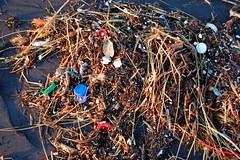
- Image by Kevin Krejci via Flickr
Environmentalists around the world agree — plastic bags are choking our landfills and polluting our seas.
Now a Tel Aviv University researcher is developing new laboratory methods using corn starch and sugar to help sustainable plastics — those that biodegrade and are even tougher than those made from petrochemicals — compete in the industry.
The answer to the problem, Prof. Moshe Kol of Tel Aviv University’s School of Chemistry says, is a new variety of catalysts — substances that initiate or sustain chemical reactions in other substances. His team has already developed several of these new catalysts, and it’s currently expanding its activities in partnership with the University of Aachen in Germany and the University of Bath in England.
Prof. Kol is improving the process of making these “green” plastics stronger and more heat-resistant, allowing them to be used in a variety of ways, from the automotive industry to Starbucks coffee cups. The type of plastic the partners are working on, polylactic acid or PLA, is a kind of biodegradable plastic made from renewable plant sources such as corn, wheat or sugarcane. It’s already used in bottles, bags, and film, and like polyester can even be woven into clothes.
Making stronger and biodegradable “Lego blocks”
The new catalysts enable the polymerization of lactide, which is the building block of a corn-based plastic. Conventional catalysts have limited control of the way in which these building blocks — the corn-based molecules — are assembled — and they may be toxic. But Prof. Kol’s catalysts can be used more safely and efficiently, making “green” plastics more commercially feasible.
“The structure of these corn-based plastics depends on several parameters. The most important is the character of the building blocks, like Lego blocks, that hold the material together,” says Prof. Kol. He aims to make sustainable corn-based plastics complement or replace the petroleum-based plastics which can take a millenium to degrade, leaving harmful pollutants in the soil and in water. Corn-based plastic wouldn’t cause any adverse health effects and would be expected to biodegrade in a compost bin in a matter of months.








